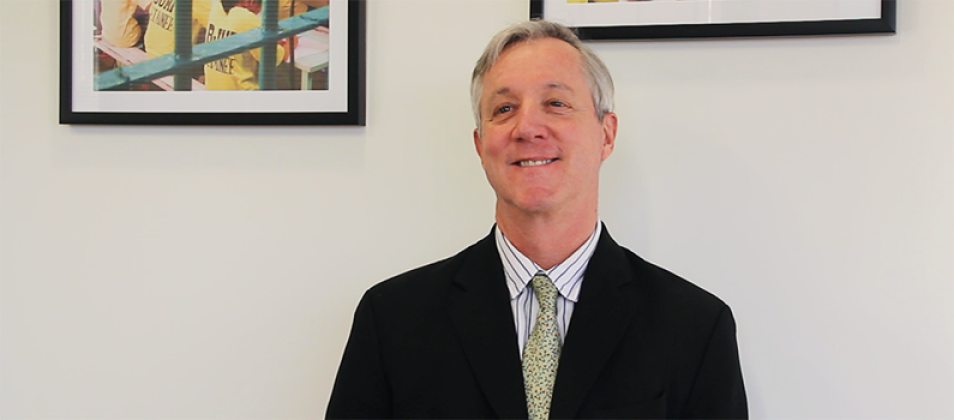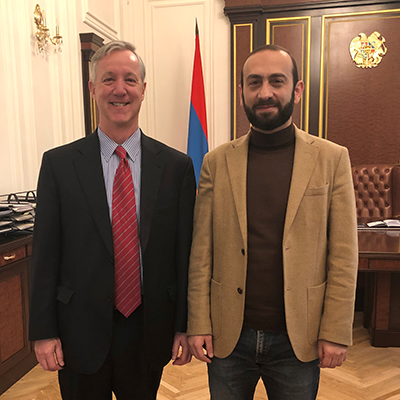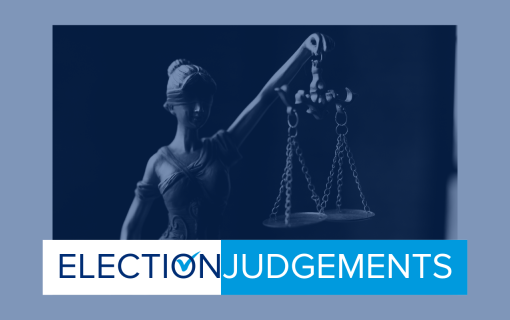
Q&A with IFES President and CEO Anthony Banbury
by Janine Duffy*
Anthony Banbury serves as the president and CEO of the International Foundation for Electoral Systems (IFES). He previously held leadership roles in diplomacy, crisis management and humanitarian assistance, and most recently served as the United Nations (UN) assistant secretary-general for field support.
What would you like IFES' supporters to know about you?
I’m really excited to have joined such an amazing organization. I’m a very values-driven and mission-driven person and I find that I feel very much at home because I think IFES is also very much a values-driven and mission-driven organization. I’m also very results-oriented – I like to make things happen, get things done, try new things, shake things up if need be. [I don't pursue change for change's sake], but I’m always looking for ways to do things better, ways to get more done, and I’m really excited to be part of IFES and look forward to doing that here.
Can you tell us about how democracy has intersected with your work at the UN and in United States (U.S.) Government work?
I’ve been working around democracy issues really for most, if not all, of my career. My very first job out of college abroad was on the Thai-Cambodian border in refugee camps. We organized [commune-level] elections inside these very large camps, something the local leaders really were eager to have. So, from very early on in my career, I was working on organizing democratic elections in foreign settings.
Then my first UN peacekeeping mission was in Cambodia in 1992-93, [which] was all about organizing elections in June 1993. I was a human rights officer and working a lot with the political opposition who were being repressed pretty violently by the ruling party. I saw in a very visceral, direct way the depravity and injustices that could be meted out by people who are just trying to run an election.
"I’ve looked at or been involved in democracy and elections work from different perspectives – field organizing, policy at the White House, operational support from UN headquarters. So, while I’m not by any means an elections expert, I’ve been working in and around elections and democracy issues really for most of my career."
Later on, when I was in the U.S. Government, I was the senior director for democracy, human rights and international operations in the National Security Council, an office that looked after democracy issues around the world. This was in the George Bush administration and he had a very forward-leaning democracy promotion agenda and so I was able to work at it from a policy perspective.
Then in one of my more recent jobs at the UN headquarters, I was an assistant secretary-general for field operations and field support. I was involved in providing operational support to UN peacekeeping and peace operations around the world, a lot of which had democracy and elections as part of their mandate. I was fielding from a very operational perspective, so I’ve looked at or been involved in democracy and elections work from different perspectives – field organizing, policy at the White House, operational support from UN headquarters. So, while I’m not by any means an elections expert, I’ve been working in and around elections and democracy issues really for most of my career.
Can you tell us about your most recent experience in the field, seeing IFES in action in Georgia and on Election Day in Armenia?
I had my first field trip as the IFES president at the beginning of December and I went to Georgia right after the second round of presidential elections and then to Armenia. I was in Armenia for their parliamentary elections on December 9th, a real historic election. As one Armenian characterized it to me, it was the most significant elections they’ve had in 25 years. And the elections ushered in a new government that really was the first time the Armenian people have had a government of the people in a long time. There was a peoples’ revolution back in the spring of 2018 and so there was an interim administration that had replaced the previous authoritarian government.
But the December 9th elections really formally put into power a new alliance of democratic parties and the mood in the country was just amazing. I was speaking to Armenian colleagues at IFES, but also people who had used to work with IFES or Armenians working in the embassies. We had gone up to the second city in Armenia, Gyumri, the night before the elections, and the day of the elections we worked our way back to Yerevan, the capital, stopping in polling stations all along the way. The mood everywhere was just really ebullient.
Armenians were remarking on how this was the first time they had participated in elections where there weren’t thugs and black jackets outside the polling stations intimidating people or people weren’t getting bussed in. The intimidation and atmosphere around the elections previously had been really rough, but in these elections, it was very positive and upbeat. This new alliance won [with] over 70 percent of the vote, and the previously ruling party got less than 5 percent. They didn’t even meet the threshold to get into Parliament, which was 5 percent. So, I spoke to an Armenian who had just been elected to Parliament the day after the elections and he said it was the first time he’d ever experienced in his life the feeling of being on the winning side of an election.
What can we look forward to in your new role as IFES’ president and CEO?
I have been so impressed by the reputation IFES has in the broader democracy and democratic governance community. [It has], in addition to a great reputation, a great set of programs and staff. But it’s a challenging world out there and there are a lot of threats to democracy around the world – rising authoritarianism, cybersecurity threats, disinformation, misinformation, hate speech, abuse of state resources. There are a lot of threats to democracy and IFES has to help our partners respond to those real serious challenges and that’s going to be top work for us. I think we have to be innovative in some new program areas so that we can continue providing the current value we have been providing for our partners, but also help them deal with some of these big threats.
I look forward to working with colleagues in IFES as well as our partners outside the organization to figure out how best to do that. We’re going to need more resources and I’m really committed to raising those resources for the organization. I’m committed to making sure that IFES is the best in the world at what it does and excited to go down that path.
"There are a lot of threats to democracy around the world – rising authoritarianism, cybersecurity threats, disinformation, misinformation, hate speech, abuse of state resources... IFES has to help our partners respond to those real serious challenges."
What in your experience at IFES so far has inspired you?
Right away I’ve been incredibly inspired by just my colleagues, the team, who are world-class experts. Then, on top of that, they are very mission-driven and values-driven. I love to see the passion in their eyes and the ideas and the thinking of my colleagues and the folks here are also very collegial.
It’s a very convivial atmosphere because while folks are working really hard, they’re just nice people to be around and that combination of professional competence, values, mission and collegiality is very inspiring to me. Of course, I’m also extremely inspired by the mission of IFES, but what really grabs me and did when I walked in the door on the first day were my colleagues.
Are there any particular aspects of IFES’ work that you’re eager to explore?
I’m very intrigued by, challenged by, the whole set of issues around cybersecurity and IFES published a report literally my first week here about cybersecurity in elections. It has a holistic approach to dealing with it, but applying those approaches in the field is going to be a real challenge.
Why does democracy matter?
Democracy is important, not just for its own sake, but democracy is peace, justice, human rights. I’ve worked in a lot of countries and in a lot of conflict-affected countries and post-conflict countries, where there are huge levels of injustice, terrible fighting, civilians killed, displaced, enormous amounts of human misery, and the root causes of those conflicts is essentially the exclusion of people from the democratic space, from access to government.
Where you have instead elite capture of government, and the people in power then use government for the benefit of themselves and those immediately around them, that leads to exclusion and conflict and all kinds of human misery and injustice. A democratic system, for all its imperfections, gives people the ability to have a say in their future, have access to influencing their government’s decisions. That then leads to justice and human rights, or at least the pursuit of justice and human rights.
I’ve seen variations of that dynamic again and again and where there’s democracy, the chances of peace, human rights, freedom, economic development are much, much higher. Where there is no democracy then the risk of conflict, injustices, human misery, lack of economic development are much higher.
"A democratic system, for all its imperfections, gives people the ability to have a say in their future, have access to influencing their government’s decisions."
How is IFES making a difference?
I traveled to see the Armenian elections on December 9th, very successful elections that ushered in a new wave of a very democratic government with a real focus on improving the lives of the Armenian population. An Armenian told me that those elections were replacing a previous authoritarian government, which had maintained his grip on power across many years, even decades, with a democratic government, and it never would have been possible without IFES.
He explained that there were many years where the population didn’t think the system would ever change and that they would always be ruled by some repressive government and they got rather pessimistic about their future and throughout that period IFES was there with them. Of course, it’s the Armenian people who deserve the credit for the decisions they’ve taken and the government they’ve elected.
But IFES was there along with them throughout that struggle and while that is just an example in Armenia, I think the same could be said in a lot of countries where people are aspiring and struggling for democracy. It’s their country, their decisions, their future, but IFES is a partner with them along the way. We give them the tools and modalities they need to attain their democratic aspirations and that’s super inspiring to bear witness to and be a part of.
"It’s their country, their decisions, their future, but IFES is a partner with them along the way."
*Janine Duffy is a communications officer at IFES.










